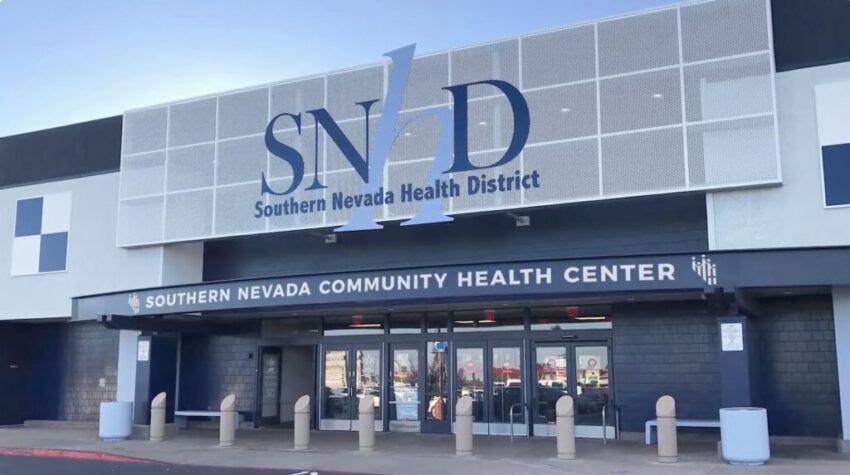(Photo: Southern Nevada Health District)
Health officials say federal attempts to bar community health clinics from offering care to people regardless of immigration status will lead to unintended consequences for Nevada’s medical infrastructure while also preventing vulnerable populations from vital services.
The Trump administration in July announced changes to long-standing federal guidelines that allowed social safety net programs including community health centers, homeless shelters, and child care programs to offer services without verifying immigration status.
“Currently, no individual is being denied services at the Health District or Southern Nevada Community Health Center under this reinterpretation,” Jennifer Sizemore, a spokeswoman with the Southern Nevada Health District, said in an email. “We are closely monitoring developments, providing input, and preparing for potential operational changes should the policy take effect. Our priority remains protecting the health of all residents and maintaining access to essential public health services.”
SNHD couldn’t answer additional questions about the potential impact of the federal policies changes on undocumented people accessing health services, since the issue is being litigated.
Days after the Nevada Attorney General Aaron Ford joined 19 other states and the District of Columbia, have signed onto a lawsuit challenging the rule, arguing it’s already sowing chaos in communities.
Dr. Cassius Lockett, the District Health Officer for the Southern Nevada Health District, told district board of health members at a July 24 meeting that “a little over 50% of our clients in the Southern Nevada Community Health Center are undocumented” and could lose access to primary care services, behavioral health services and family planning under the rule change as written.
Lockett didn’t specify an exact figure of the number of undocumented patients who could lose access to health services at the district.
The district is conducting an analysis to understand the fiscal impact from the federal changes, he said.
The Personal Responsibility and Work Opportunity Reconciliation Act of 1996 had a long-standing practice of allowing various community based programs that rely on federal funds to serve people regardless of immigration status.
The U.S. Department of Health and Human Services announced July 10 it would reverse that policy and require agencies to check immigration status.
“For too long, the government has diverted hardworking Americans’ tax dollars to incentivize illegal immigration,” said Secretary Robert F. Kennedy, Jr in a statement.
In their suit challenging the policy reversal, attorneys general argued multiple programs “cannot realistically conduct verification at the door, such as 24/7 crisis hotlines, emergency services for individuals suffering an overdose, and homeless shelters.”
“Even if some programs could implement such verification with time and resources, vulnerable people lack government identification when accessing these services for myriad reasons—some may be undocumented immigrants, but many others are U.S. Citizens or permanent residents,” the suit contends. “For the first time, millions of people are facing a new demand before they can access the Nation’s most essential programs: ‘show me your papers.’
Dr. Frank Nemec, the vice chair for the health board, said during the board’s July 24 meeting that the decision wasn’t just cruel but could have a “devastating economic impact on an already fragile medical infrastructure” in Nevada.
Another “unintended consequence” could mean emergency rooms and trauma systems seeing an uptick in people who normally seek health services through community clinics, Lockett said.
Federally Qualified Health Centers, which receive federal funding to provide primary care to underserved populations, are still unclear on the full impact of the rule change, said Randy Smith, the CEO of Southern Nevada Community Health Center.
“The individuals that we’re talking about are some of the most vulnerable members of our community,” he said. “There’s also a public health implication. They may have communicable diseases that are going to go untreated. Certainly on the individual level, it’s about quality of life … It’s a whole system of care really impacted in a very significant way in terms of access to care and the costs associated with that care.”
While roughly half of the patients coming into the Southern Nevada Community Health Center are uninsured, Smith said he wasn’t sure how many lacked health insurance because they didn’t have legal status.
“The health center program has never had a requirement to collect eligibility documentation,” he said. “What I do know is a significant portion of them are and that’s because we’ve made efforts to help folks get on insurance and they’ve been unable to do so.”
There are also public health implications around the spread of communicable diseases.
The guidelines, if fully implemented, would mean immunizations, communicable disease testing and screening could be carried out without checking immigration status, Lockett said.
Some in the board worried that many people, even those who are legal permanent residents or have Green Cards, aren’t seeking care, including vaccinations.
Lockett said the district is working on doing more outreach to “make it clear they still have access to immunization services at the health district and they still have access to communicable disease services.
Click this link for the original source of this article.
Author: Michael Lyle
This content is courtesy of, and owned and copyrighted by, https://www.nevadacurrent.com and its author. This content is made available by use of the public RSS feed offered by the host site and is used for educational purposes only. If you are the author or represent the host site and would like this content removed now and in the future, please contact USSANews.com using the email address in the Contact page found in the website menu.








